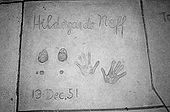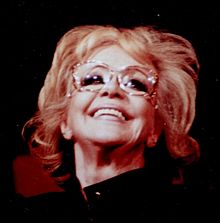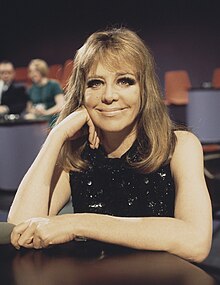Hildegard Knef
You can help expand this article with text translated from the corresponding article in German. (August 2010) Click [show] for important translation instructions.
|
Hildegard Frieda Albertine Knef (German: [ˈhɪl.də.ɡaʁt ˈkneːf] ; 28 December 1925 – 1 February 2002) was a German actress, singer, and writer. She was billed in some English-language films as Hildegard Neff or Hildegarde Neff.
Early years
[edit]Hildegard Knef was born in Ulm in 1925. Her parents were Hans Theodor and Friede Augustine Knef. Her father, a decorated First World War veteran, died when she was only six months old, and her mother moved to Berlin and worked in a factory.[1] Knef began studying acting at age 14 in 1940. She left school at 15 to become an apprentice animator with Universum Film AG. After she had a successful screen test, she went to the State Film School at Babelsberg, Berlin, where she studied acting, ballet, and elocution. Joseph Goebbels, who was Hitler's propaganda minister, wrote to her and asked to meet her, but Knef's friends wanted her to stay away from him.[1]
German film career
[edit]When the film "Träumerei" was made in 1944, Knef shot some scenes, which would have marked her film debut, but these were left out of the final cut. She did appear in several films before the fall of Nazi Germany, but most were released only afterward.
During the Battle of Berlin she dressed as a soldier to stay with her lover, Ewald von Demandowsky, and joined him in the defence of Schmargendorf.[2] The Soviets captured her and sent her to a prison camp.[3] Her fellow prisoners helped her escape and return to Berlin. Von Demandowsky was executed by the Russians on 7 October 1946, but before that he secured for Knef the protection of the well-known character actor Viktor de Kowa in Berlin. De Kowa gave her the opportunity to be a mistress of ceremonies in the theatre that he had opened. Knef also got a part in Marcel Pagnol's Marius, which was directed by Boleslaw Barlog. De Kowa also directed Knef in other plays by Shakespeare, Pagnol, and George Abbott.[1]
Her two best known film roles were "Susanne Wallner" in Wolfgang Staudte's film Die Mörder sind unter uns (The Murderers Are Among Us), produced in 1946 by the East German state film company, and the first film released after the Second World War in East Germany; and "Marina" in Die Sünderin (The Sinner), in which she performed a brief nude scene, the first in German film history, which caused a scandal in 1951.[4] The film was also criticised by the Catholic Church, which protested against the nude scene. Knef stated that she didn't understand the tumult that the film was creating. She wrote that it was totally absurd that people considered her nudity to be scandalous, as Germany was the country that had created Auschwitz and had caused so much horror. She also wrote, "I had the scandal, the producers got the money."[1]
In 1948, she received the best-actress award from the Locarno Film Festival because of her role in the film Film Without a Title. Her singing career started in the 1960s once her film career was not going very well. She performed in television shows such as in episodes of Scarecrow and Mrs. King and in a 2000 documentary in which she was playing by herself Marlene Dietrich: Her Own Song.[5]
In the 1960s she appeared in a number of low-budget films, including The Lost Continent.
She appeared in the 1975 screen adaptation of the Hans Fallada novel, Every Man Dies Alone directed by Alfred Vohrer,[6] released in English as Everyone Dies Alone in 1976, and for which she won an award for best actress at the International Film Festival in Karlovy Vary, then Czechoslovakia.[3]
During her career, she performed in over 50 films. Nineteen of her films were produced in countries other than Germany: the United States, United Kingdom, France, Italy, Austria and Spain.[7]
Career in the United States
[edit]
David O. Selznick invited her to Hollywood, but she refused to agree to the conditions of the contract which reportedly included changing her name to Gilda Christian and pretending to be Austrian rather than German.[3] Knef was cast as Hilde in the Hollywood film Decision Before Dawn (1951), directed by Anatole Litvak and co-starring with Richard Basehart and Oskar Werner in a story about the later part of World War II.[1]
The following year Knef's first husband, an American named Kurt Hirsch, encouraged her to try again for success in the U.S. She changed her name from Knef to Neff, but was only offered a supporting role in The Snows of Kilimanjaro (1952), an adaptation of an Ernest Hemingway short story.[8]
Her reputation in the U.S. was hurt because of her nude scenes in the German film Die Sünderin (1951) and because she fell in love with a Nazi when she was 19.[9]
Finally, in 1955, Knef was offered a starring role in the Broadway musical Silk Stockings by Cole Porter, which was based on the 1939 film Ninotchka, which had starred Greta Garbo in the title role. Knef had acted in at least 30 films in the United States and Europe, but her triumph came in New York when she played Ninotchka, an unemotional Soviet commissar. The New York Times drama critic Brooks Atkinson described her rendition as "an immensely skillful performance."[1]
Singer
[edit]In the 1960s, Knef took a break from acting and started writing song lyrics. In 1963 she started a concert and recording career,[1] and she surprised her audiences with the deep, smoky quality of her voice and with lyrics that were written by herself. Fans around the world rallied in her support as she defeated cancer several times. She returned to Berlin after the reunification. In her peak, an entertainment columnist called her the "willowy blonde" who had a "dusty voice" and a "generous mouth".[1]
The song she is mostly remembered for is "Für mich soll's rote Rosen regnen" ("Red roses are to rain for me"). She is also known for her version of the songs "Ich hab noch einen Koffer in Berlin" ("I still have a suitcase in Berlin") and "Mackie Messer" ("Mack the Knife").[10] She sold more than three million records in total.
She launched 23 original albums which counted for 320 different songs. She wrote the lyrics for 130 songs herself.[7]
Publications
[edit]
Her autobiography Der geschenkte Gaul: Bericht aus einem Leben (The Gift Horse: Report on a Life, 1970) was a candid recount of her life in Germany during and after the Second World War, and reportedly became the best-selling German book in the post-war years. Her second book Das Urteil (The Verdict, 1975) was a moderate success, and dealt with her struggle with breast cancer. Knef not only achieved international best-seller status, her books were also widely praised by critics because her autobiographies were "better-than-the-average celebrity's".
In The Gift Horse: Report on a Life Knef recounted her childhood and difficult life being an actress and singer while living in Hitler's Berlin and after the war in Europe and America. Arthur Cooper of Newsweek called it "a bitterly honest book and a very good one".[5] The book doesn't try to persuade the public, depicting a made-up celebrity's adventures, but truthfully recounts her struggles as a German woman who grew up in Berlin under the Nazis.The Gift Horse: Report on a Life was translated to English by Knef's second husband, David Anthony Palastanga.[9]
In The Verdict, which was also translated by Palastanga, Knef looked at her life from another perspective, because she knew that she had cancer. Rachel MacKenzie wrote that Knef had her 56th operation, a mastectomy, in Salzburg on 10 August 1973. MacKenzie stated that from that cancer surgery, life had to be thought of in terms of pre-verdict and post-verdict. The book is divided in these two sections but they are not chronologically ordered because Knef wrote the two sections in a way that the reader is moved forward and backward in time and space. The Verdict describes in great detail the hospital scenes as well as the doctors and nurses in New York, Los Angeles, Zürich and Hamburg, where she was hospitalised.[11]
Personal life
[edit]Knef was married three times and divorced twice.[1] Her first marriage was in 1947 to Kurt Hirsch, a U.S. information officer. They divorced in 1952. The second time she married the actor and record producer David Anthony Palastanga, on 30 June 1962. Knef had a daughter with him born in 1968, Christina Antonia.[5] When she died, she was still married to her third husband, Paul von Schell.
On February 1, 2002, Knef died at the age of 76 of a lung infection in Berlin, where she had moved after the German reunification. She smoked heavily for most of her life and suffered from emphysema.[1]
Selected filmography
[edit]- The Noltenius Brothers (1945)
- Frühlingsmelodie (1945) - Zwilling ohne Leberfleck
- Under the Bridges (1946) - Girl in Havelberg
- Murderers Among Us (1946) - Susanne Wallner
- Between Yesterday and Tomorrow (1947) - Das Mädchen Kat
- Film Without a Title (1948) - Christine Fleming
- Journey to Happiness (1948) - Susanne Loevengaard
- The Sinner (1951) - Marina
- Miracles Still Happen (1951) - Anita Weidner
- Decision Before Dawn (1951) - Hilde
- Nights on the Road (1952) - Inge Hoffmann
- Diplomatic Courier (1952) - Janine Betki
- The Snows of Kilimanjaro (1952) - Countess Liz
- Night Without Sleep (1952) - Lisa Muller
- Alraune (1952) - Alraune
- Henriette (1952) - Rita Solar
- Illusion in a Minor Key (1952) - Lydia Bauer
- The Man Between (1953) - Bettina
- A Love Story (1954) - Lili Schallweiß, Schauspielerin
- It Was Always So Nice With You (1954) - minor role (uncredited)
- Confession Under Four Eyes (1954) - Hilde Schaumburg-Garden
- Svengali (1954) - Trilby
- Escape from Sahara (1958) - Madeleine Durand
- The Daughter of Hamburg (1958) - Maria
- Subway in the Sky (1959) - Lilli Hoffman
- The Man Who Sold Himself (1959) - Martina Schilling
- La strada dei giganti (1960) - Maria Luisa di Borbone
- No Orchids for Lulu (1962) - Baroness Geschwitz
- Ipnosi (1962)
- Caterina di Russia (1963) - Catherine the Great
- Landru (1963) - Mme X. / Madame Ixe
- Three Penny Opera (1963) - Jenny Diver
- Ballade pour un voyou (1963) - Martha Schwartz
- And So to Bed (1963) - Callgirl
- Gibraltar (1964) - Elinor van Berg
- Waiting Room to the Beyond (1964) - Laura Lorelli
- Condemned to Sin (1964) - Alwine
- Mozambique (1964) - Ilona Valdez
- The Dirty Dozen (1967) - (uncredited)
- The Lost Continent (1968) - Eva Peters
- Everyone Dies Alone (1976) - Anna Quangel
- Fedora (1978) - The Countess
- Why the UFOs Steal Our Lettuce (1980) - Peter's mother
- Der Gärtner von Toulouse (1982) - Frau Théophot
- The Future of Emily (1984) - Mutter Paula
- Witchery (1988) - Lady in black
- Pocahontas (1995) - (German dub)
- An Almost Perfect Wedding (1999) - Marlene Wolf-Schönberg - Hennys aunt
Further reading
[edit]- Bach, Ulrich E.: The Woman Between: Hildegard Knef's Cold War Berlin Movies in: Broadbent, Philip & Hake, Sabine (eds.) "Berlin: Divided City 1945-1989" (NYC: Berghahn Books, 2010): pp. 115–125.
- Kusztrich, Imre: Ich bin kein Mannequin für Krebs. Reden, fühlen, zittern mit Hildegard Knef. Erinnerungen und Gespräche aus den schwierigsten Jahren einer großen Künstlerin im aufreibenden Kampf mit Medien und Alltag IGK-Verlag, Neusiedl/Österreich 2011, ISBN 978-3-9503215-3-1.
- Roek, Petra: Fragt nicht, warum: Hildegard Knef – die Biografie. Edel Edition, Hamburg 2009, ISBN 978-3-941378-01-8.
- Schröder, Christian: Hildegard Knef. Mir sollten sämtliche Wunder begegnen. Biographie. Aufbau-Verlag, Berlin 2004, ISBN 3-351-02575-0.
- Trimborn, Jürgen: Hildegard Knef. Das Glück kennt nur Minuten. Deutsche Verlags-Anstalt, München 2005, ISBN 3-421-05827-X.
- Weidner, Corinna (Hrsg.): Hildegard Knef. Fotografien von Rico Puhlmann. Schwarzkopf & Schwarzkopf Verlag, München 2005, ISBN 3-89602-662-3.
- Weißbarth, Eberhard: Hildegard Knef – zwischen gestern und heute. Verlag Bibliothek der Provinz, Weitra/Österreich 2011, ISBN 978-3-85252-910-3.
References
[edit]- ^ a b c d e f g h i j Binder, David (2 February 2002). "Hildergard Knef, 76, Actress Who Escaped P.O.W. Camp". The New York Times. p. C16. Retrieved 2 February 2024.
- ^ Beevor, A (2003) Berlin: The Downfall 1945, Penguin Books, p. 311
- ^ a b c Gurke, Thomas M. "Hildergard Knef". Impressum. Retrieved 10 January 2013.
- ^ Ralf Schmitt, "Hildegard Knef ist tot" Spielfilm (1 February 2002). Retrieved 5 March 2012 (in German)
- ^ a b c "Hildegard Knef". Gale. 2002. Retrieved 29 April 2014.
- ^ Warneke, Peter. "Biographie Carl Raddatz". Film Museum Potsdam. Retrieved 5 March 2012.
- ^ a b Gurke, Thomas M. "Hildegard Knef – 10 Facts At a Glance". Impressum. Archived from the original on 5 July 2023. Retrieved 2 February 2024.
- ^ Holloway, Ron (2 February 2002). "Hildegard Knef". The Guardian. London. Archived from the original on 13 June 2014. Retrieved 2 February 2024.
- ^ a b Broyard, Anatole (15 June 1971). "Germany's War-Scarred Beauty". New York Times. p. 41. Retrieved 2 February 2024.
- ^ English lyrics for Mackie Messer by Hildegard Knef Archived 11 June 2011 at the Wayback Machine
- ^ MacKenzie, Rachel (25 January 1976). "Concerning pain and beauty: The Verdict". New York Times. p. 264. Retrieved 2 February 2024.
External links
[edit]- Hildegard Knef[permanent dead link] in the German Dubbing Card Index
- Hildegard Knef at IMDb
- Works by Hildegard Knef at Open Library
- Fan site, officially authorized*(in German) (partly in English)
- 1925 births
- 2002 deaths
- Burials at the Waldfriedhof Zehlendorf
- Deaths from emphysema
- German autobiographers
- German film actresses
- German musical theatre actresses
- German prisoners of war in World War II held by the Soviet Union
- German stage actresses
- German voice actresses
- German women writers
- Officers Crosses of the Order of Merit of the Federal Republic of Germany
- People from the Free People's State of Württemberg
- Actors from Ulm
- Recipients of the Order of Merit of Berlin
- German women autobiographers
- 20th-century German actresses
- 20th-century German women singers
- German escapees
- Escapees from Soviet detention
- Polio survivors
- Actresses from Baden-Württemberg

